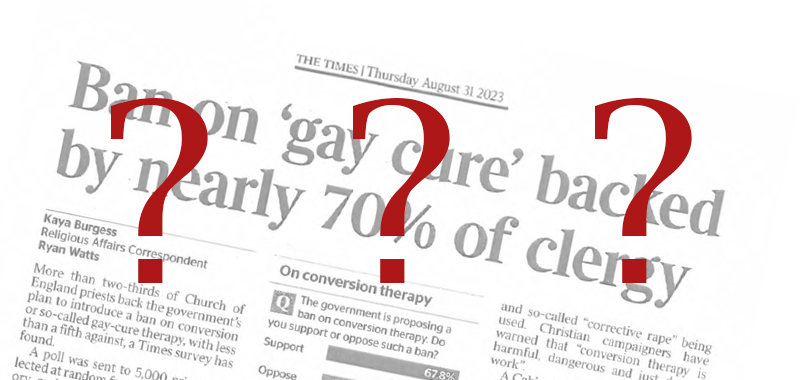
The Times ‘misleading the public’ over banning conversion therapy
The Times today reports that a majority of Church of England clergy support a ban on conversion therapy.
The claim follows other findings released from a survey it carried out on Anglican Church leaders in England.
But the Times has been slammed for inaccuracy in its reporting of the figures. Revd Dr Ian Paul, an official supporter of the Let Us Pray campaign, told Times Radio the approach is “the worst possible way of doing a survey”.
Polling method
The journalists responsible for the poll sent it to a ‘random’ selection of 5000 clergy and received around 1200 responses. That represents just 6% of the Church of England’s active clergy.
To ensure accuracy over such a limited number of responses, the poll would need to have used ‘representative sampling’ – a method of balancing the responses to help ensure they don’t over-represent one viewpoint or another.
But The Times didn’t bother. It didn’t engage a professional polling company. Instead it just sent out surveys and reported on those that came back. In fact it seems virtually no thought was given to methodology at all. That is borne out in the results, Revd Dr Paul explained: many of the poll’s results “are completely contradicted by evidence elsewhere”.
Poorly written questions
Such a survey could be argued to still give a vague impression of the results. But there is another problem: the survey itself was very badly written.
Those who were sent the survey report that the questions were written to get the answer the journalist wanted. Some apparently refused to fill in the survey because they felt it was seeking to present a biased picture.
And these cues would also have been picked up by those whose supposedly ‘progressive’ agenda was being encouraged. They will have been keen to ensure they skew the figures towards their viewpoint. For all we know, they could have encouraged responses behind the scenes.
What is meant by ‘conversion therapy’?
When it comes to ‘conversion therapy’, the survey appears to have been particularly confusing. The Times reports the question as: “The government is proposing a ban on conversion therapy. Do you support or oppose such a ban?”
But what do they mean by “such a ban”? It is impossible to claim that a ban has widespread support, when no Bill has yet been published. The Government’s precise plans remain under wraps and The Times appears not to have given any more detail on what they envisioned it covering. It is very likely some who currently give the ban their backing will change their tune when there is more clarity on its precise wording.
Very few would support a ban of the sort campaign leader Jayne Ozanne is calling for, which covers even “gentle, non-coercive prayer” and “casual conversations”. Yet it is Ozanne The Times has turned to for comment.
Poorly reported results
And The Times’ own reporting of the results is also very poor. It uses the phrase “a majority of priests” in relation to its results, for example. But it cannot know the view of the majority, since it only surveyed an unrepresentative portion.
And not all those surveyed were ‘priests’ in the way usually understood by the public. The survey was sent to “active clergy”, a category which will include both those who lead congregations and many who do not.
It doesn’t take into account the fact that ministers of larger congregations will have been less likely to reply. Nor is the impact of summer holidays, conferences and camps taken account of.
Misleading the public
The result is that the poll is very poor by journalistic standards. It shows either a lack of knowledge about how studies should be carried out, or a wilful disregard for ethics and accuracy.
The Bible teaches that all people are made in God’s image and have inherent dignity. No Christians support the abusive treatment of LGBT people. So it is no surprise that some want to support a ban that purports to tackle abuse. But a ban could go much further, criminalising those who merely disagree with LGBT ideology.
The Let Us Pray campaign includes Christians across a wide range of denominations who are concerned about proposals to ban so-called ‘conversion therapy’. And it is not only Christians who fear the unintended consequences of a law.
There is no doubt that the public will be misled by The Times’ claims.
Sex Matters responds to Stonewall’s ludicrous “conversion” claims
2025-05-14 07:17:58
